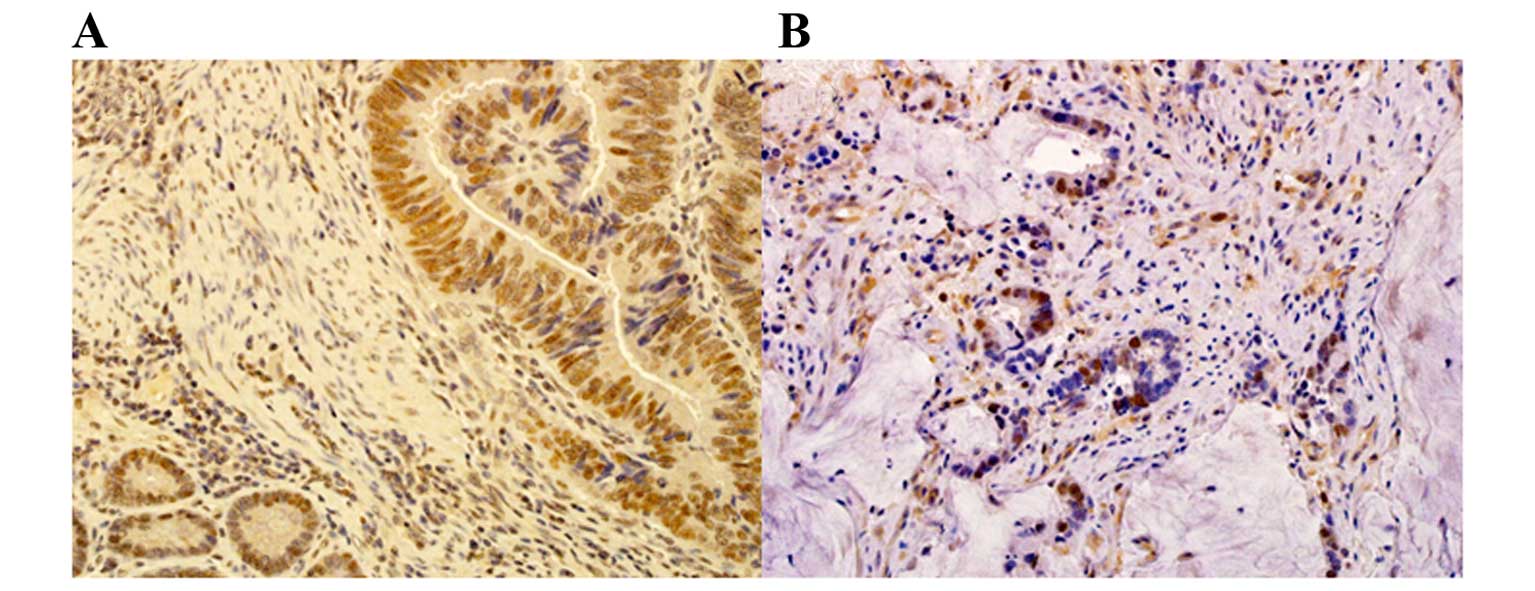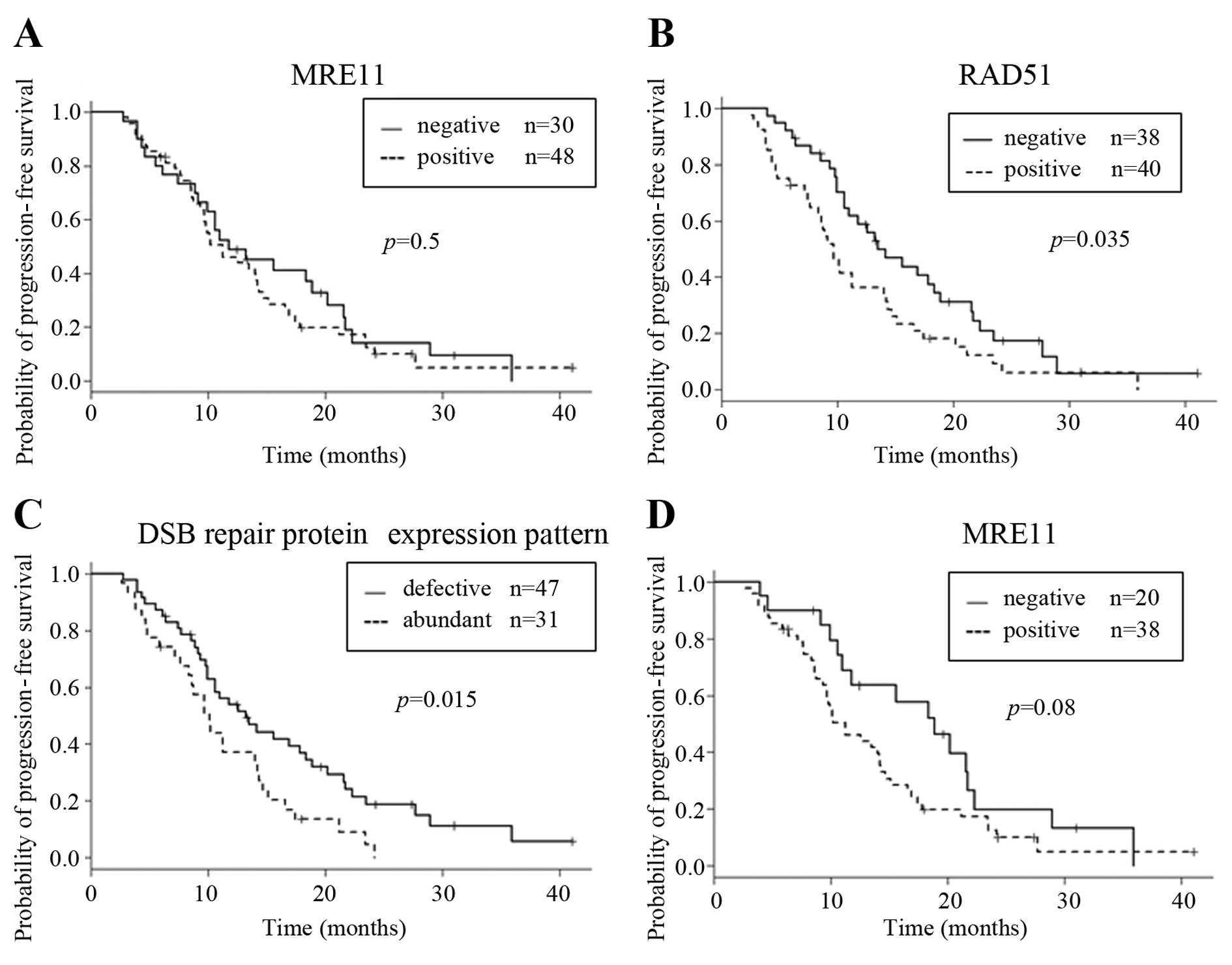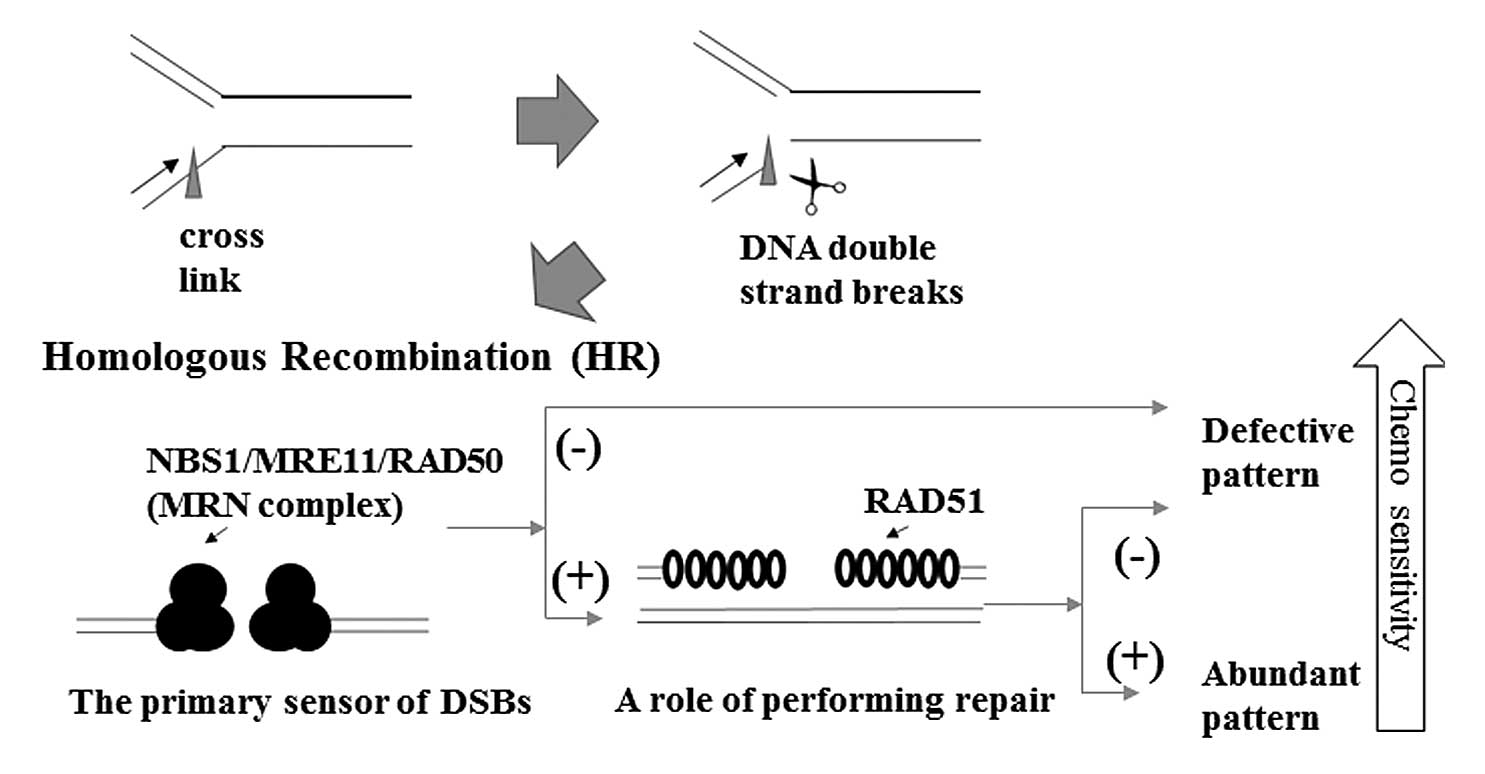|
1
|
Tournigand C, André T, Achille E, Lledo G,
Flesh M, Mery-Mignard D, Quinaux E, Couteau C, Buyse M, Ganem G, et
al: FOLFIRI followed by FOLFOX6 or the reverse sequence in advanced
colorectal cancer: A randomized GERCOR study. J Clin Oncol.
22:229–237. 2004. View Article : Google Scholar
|
|
2
|
Yamaguchi S, Ogata H, Katsumata D,
Nakajima M, Fujii T, Tsutsumi S, Asao T, Sasaki K, Kuwano H and
Kato H: Early serum carcinoembryonic antigen reduction predicts
tumor shrinkage and overall survival in colorectal cancer patients
with distant metastasis, after primary surgery followed by mFOLFOX6
plus bevacizumab treatment. Hepatogastroenterology. In press.
|
|
3
|
Grothey A, Sargent D, Goldberg RM and
Schmoll HJ: Survival of patients with advanced colorectal cancer
improves with the availability of fluorouracil-leucovorin,
irinotecan, and oxaliplatin in the course of treatment. J Clin
Oncol. 22:1209–1214. 2004. View Article : Google Scholar : PubMed/NCBI
|
|
4
|
Saltz LB, Clarke S, Díaz-Rubio E,
Scheithauer W, Figer A, Wong R, Koski S, Lichinitser M, Yang TS,
Rivera F, et al: Bevacizumab in combination with oxaliplatin-based
chemotherapy as first-line therapy in metastatic colorectal cancer:
A randomized phase III study. J Clin Oncol. 26:2013–2019. 2008.
View Article : Google Scholar : PubMed/NCBI
|
|
5
|
Van Cutsem E, Köhne CH, Hitre E, Zaluski
J, Chang Chien CR, Makhson A, D'Haens G, Pintér T, Lim R, Bodoky G,
et al: Cetuximab and chemotherapy as initial treatment for
metastatic colorectal cancer. N Engl J Med. 360:1408–1417. 2009.
View Article : Google Scholar : PubMed/NCBI
|
|
6
|
Ribic CM, Sargent DJ, Moore MJ, Thibodeau
SN, French AJ, Goldberg RM, Hamilton SR, Laurent-Puig P, Gryfe R,
Shepherd LE, et al: Tumor microsatellite-instability status as a
predictor of benefit from fluorouracil-based adjuvant chemotherapy
for colon cancer. N Engl J Med. 349:247–257. 2003. View Article : Google Scholar : PubMed/NCBI
|
|
7
|
Chiu SJ, Lee YJ, Hsu TS and Chen WS:
Oxaliplatin-induced gamma-H2AX activation via both p53-dependent
and -independent pathways but is not associated with cell cycle
arrest in human colorectal cancer cells. Chem Biol Interact.
182:173–182. 2009. View Article : Google Scholar : PubMed/NCBI
|
|
8
|
Asakawa H, Koizumi H, Koike A, Takahashi
M, Wu W, Iwase H, Fukuda M and Ohta T: Prediction of breast cancer
sensitivity to neoadjuvant chemotherapy based on status of DNA
damage repair proteins. Breast Cancer Res. 12:R172010. View Article : Google Scholar : PubMed/NCBI
|
|
9
|
Turner N, Tutt A and Ashworth A: Hallmarks
of 'BRCAness' in sporadic cancers. Nat Rev Cancer. 4:814–819. 2004.
View Article : Google Scholar : PubMed/NCBI
|
|
10
|
Chu G: Double strand break repair. J Biol
Chem. 272:24097–24100. 1997. View Article : Google Scholar : PubMed/NCBI
|
|
11
|
Gallagher DJ, Konner JA, Bell-McGuinn KM,
Bhatia J, Sabbatini P, Aghajanian CA, Offit K, Barakat RR, Spriggs
DR and Kauff ND: Survival in epithelial ovarian cancer: A
multivariate analysis incorporating BRCA mutation status and
platinum sensitivity. Ann Oncol. 22:1127–1132. 2011. View Article : Google Scholar
|
|
12
|
Moynahan ME, Cui TY and Jasin M:
Homology-directed DNA repair, mitomycin-c resistance, and
chromosome stability is restored with correction of a Brca1
mutation. Cancer Res. 61:4842–4850. 2001.PubMed/NCBI
|
|
13
|
Stracker TH and Petrini JH: The MRE11
complex: Starting from the ends. Nat Rev Mol Cell Biol. 12:90–103.
2011. View
Article : Google Scholar : PubMed/NCBI
|
|
14
|
Williams RS, Williams JS and Tainer JA:
Mre11-Rad50-Nbs1 is a keystone complex connecting DNA repair
machinery, double-strand break signaling, and the chromatin
template. Biochem Cell Biol. 85:509–520. 2007. View Article : Google Scholar : PubMed/NCBI
|
|
15
|
Baumann P and West SC: Role of the human
RAD51 protein in homologous recombination and double-stranded-break
repair. Trends Biochem Sci. 23:247–251. 1998. View Article : Google Scholar : PubMed/NCBI
|
|
16
|
Slupianek A, Schmutte C, Tombline G,
Nieborowska-Skorska M, Hoser G, Nowicki MO, Pierce AJ, Fishel R and
Skorski T: BCR/ABL regulates mammalian RecA homologs, resulting in
drug resistance. Mol Cell. 8:795–806. 2001. View Article : Google Scholar : PubMed/NCBI
|
|
17
|
Takenaka T, Yoshino I, Kouso H, Ohba T,
Yohena T, Osoegawa A, Shoji F and Maehara Y: Combined evaluation of
Rad51 and ERCC1 expressions for sensitivity to platinum agents in
non-small cell lung cancer. Int J Cancer. 121:895–900. 2007.
View Article : Google Scholar : PubMed/NCBI
|
|
18
|
Piessevaux H, Buyse M, Schlichting M, Van
Cutsem E, Bokemeyer C, Heeger S and Tejpar S: Use of early tumor
shrinkage to predict long-term outcome in metastatic colorectal
cancer treated with cetuximab. J Clin Oncol. 31:3764–3775. 2013.
View Article : Google Scholar : PubMed/NCBI
|
|
19
|
Yoshida M, Goto M, Kii T, Nishitani H,
Kawabe S, Kuwakado S, Asaishi K, Miyamoto T and Higuchi K:
Retrospective study as first-line chemotherapy combined anti-VEGF
antibody with fluoropyrimidine for frail patients with unresectable
or metastatic colorectal cancer. Digestion. 87:59–64. 2013.
View Article : Google Scholar : PubMed/NCBI
|
|
20
|
Maeda K, Shibutani M, Otani H, Nagahara H,
Sugano K, Ikeya T, Kubo N, Amano R, Kimura K, Muguruma K, et al:
Low nutritional prognostic index correlates with poor survival in
patients with stage IV colorectal cancer following palliative
resection of the primary tumor. World J Surg. 38:1217–1222. 2014.
View Article : Google Scholar
|
|
21
|
Thompson LH and Schild D: The contribution
of homologous recombination in preserving genome integrity in
mammalian cells. Biochimie. 81:87–105. 1999. View Article : Google Scholar : PubMed/NCBI
|
|
22
|
Sung P and Robberson DL: DNA strand
exchange mediated by a RAD51-ssDNA nucleoprotein filament with
polarity opposite to that of RecA. Cell. 82:453–461. 1995.
View Article : Google Scholar : PubMed/NCBI
|
|
23
|
Nakanoko T, Saeki H, Morita M, Nakashima
Y, Ando K, Oki E, Ohga T, Kakeji Y, Toh Y and Maehara Y: Rad51
expression is a useful predictive factor for the efficacy of
neoadjuvant chemoradiotherapy in squamous cell carcinoma of the
esophagus. Ann Surg Oncol. 21:597–604. 2014. View Article : Google Scholar :
|
|
24
|
Tsai MS, Kuo YH, Chiu YF, Su YC and Lin
YW: Down-regulation of Rad51 expression overcomes drug resistance
to gemcitabine in human non-small-cell lung cancer cells. J
Pharmacol Exp Ther. 335:830–840. 2010. View Article : Google Scholar : PubMed/NCBI
|
|
25
|
Hannay JA, Liu J, Zhu QS, Bolshakov SV, Li
L, Pisters PW, Lazar AJ, Yu D, Pollock RE and Lev D: Rad51
overexpression contributes to chemoresistance in human soft tissue
sarcoma cells: A role for p53/activator protein 2 transcriptional
regulation. Mol Cancer Ther. 6:1650–1660. 2007. View Article : Google Scholar : PubMed/NCBI
|
|
26
|
Giannini G, Rinaldi C, Ristori E,
Ambrosini MI, Cerignoli F, Viel A, Bidoli E, Berni S, D'Amati G,
Scambia G, et al: Mutations of an intronic repeat induce impaired
MRE11 expression in primary human cancer with microsatellite
instability. Oncogene. 23:2640–2647. 2004. View Article : Google Scholar : PubMed/NCBI
|
|
27
|
Vilar E, Bartnik CM, Stenzel SL, Raskin L,
Ahn J, Moreno V, Mukherjee B, Iniesta MD, Morgan MA, Rennert G, et
al: MRE11 deficiency increases sensitivity to poly(ADP-ribose)
polymerase inhibition in microsatellite unstable colorectal
cancers. Cancer Res. 71:2632–2642. 2011. View Article : Google Scholar : PubMed/NCBI
|
|
28
|
Sargent DJ, Marsoni S, Monges G, Thibodeau
SN, Labianca R, Hamilton SR, French AJ, Kabat B, Foster NR, Torri
V, et al: Defective mismatch repair as a predictive marker for lack
of efficacy of fluorouracil-based adjuvant therapy in colon cancer.
J Clin Oncol. 28:3219–3226. 2010. View Article : Google Scholar : PubMed/NCBI
|
|
29
|
Yamaguchi S, Ogata H, Katsumata D,
Nakajima M, Fujii T, Tsutsumi S, Asao T, Sasaki K, Kuwano H and
Kato H: MUTYH- associated colorectal cancer and adenomatous
polyposis. Surg Today. 44:593–600. 2014. View Article : Google Scholar
|

















